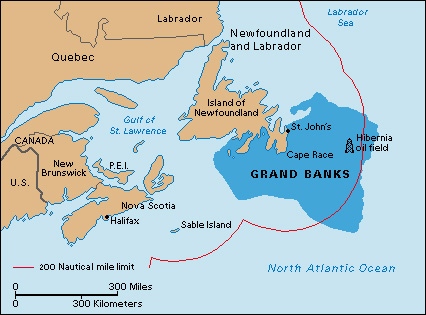Grand Banks are a group of underwater plateaus, known as banks, that lie in the Atlantic Ocean off the coast of the Canadian island of Newfoundland. The Grand Banks area covers about 139,000 square miles (360,000 square kilometers). The ocean is shallow—generally less than 330 feet (100 meters) deep—above the Grand Banks. The waters of the Grand Banks are rich in plankton, small organisms that fish like to eat. Fish that live in the area include cod, flounder, haddock, halibut, herring, and redfish. This area was one of the world’s richest fishing areas until the late 1900’s. At that time, the Canadian government, in response to overfishing, placed restrictions on fish catches in the Grand Banks.

During the early 1500’s, cod attracted large numbers of European fishing vessels to the Grand Banks. By the late 1500’s, English and French crews dominated fishing in the area and had established stations on Newfoundland to dry, salt, and pack cod for shipment to Europe. Through the years, fishing fleets traveled from many countries, including France, Portugal, Russia, Spain, the United Kingdom, and the United States, to fish in the Grand Banks. Crews from Newfoundland and Nova Scotia also caught many fish.
Because of intense competition for large catches, the fish stocks of the Grand Banks had declined greatly by the 1960’s. In 1977, Canada extended its authority to cover all areas within 200 nautical miles (370 kilometers) of its coastline. Today, boats must have a license from Canada to fish in this zone, which includes most of the Grand Banks. Canada also regulates the total amount of each kind of fish that fishing boats may take from the Grand Banks. Limits on fishing have harmed the economies of fishing communities in eastern Newfoundland.
During the late 1970’s, surveys showed that petroleum deposits lay under and around the Grand Banks. In 1997, oil production began in the Hibernia oil field, on the eastern flank of the Grand Banks, in deeper water. Since then, oil companies have developed other oil fields in the same area. They manage the offshore wells carefully to prevent further endangering fish stocks. Petroleum wealth has replaced fishing as a major contributor to the provincial economy of Newfoundland and Labrador.
